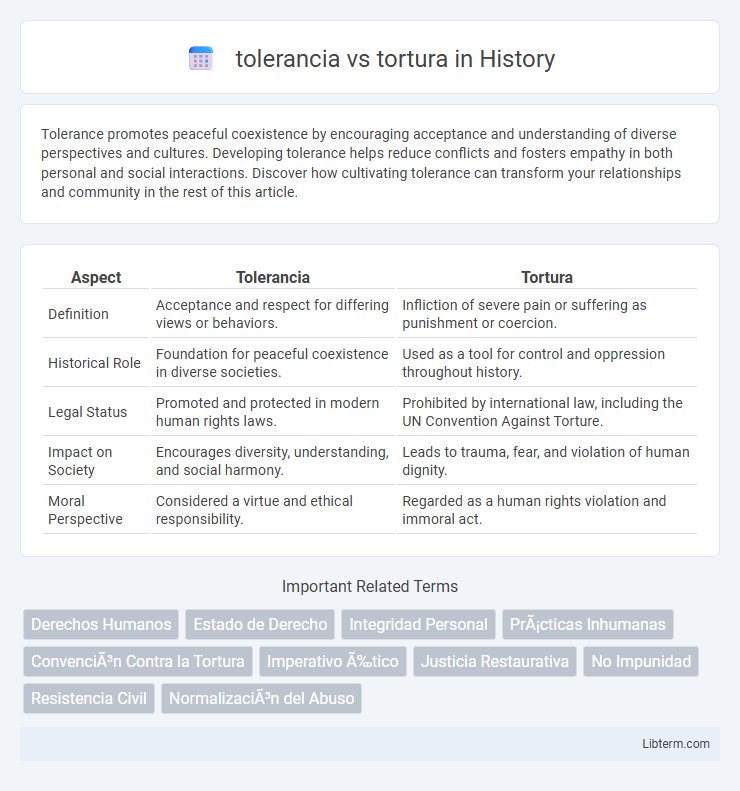Tolerance promotes peaceful coexistence by encouraging acceptance and understanding of diverse perspectives and cultures. Developing tolerance helps reduce conflicts and fosters empathy in both personal and social interactions. Discover how cultivating tolerance can transform your relationships and community in the rest of this article.
Table of Comparison
| Aspect | Tolerancia | Tortura |
|---|---|---|
| Definition | Acceptance and respect for differing views or behaviors. | Infliction of severe pain or suffering as punishment or coercion. |
| Historical Role | Foundation for peaceful coexistence in diverse societies. | Used as a tool for control and oppression throughout history. |
| Legal Status | Promoted and protected in modern human rights laws. | Prohibited by international law, including the UN Convention Against Torture. |
| Impact on Society | Encourages diversity, understanding, and social harmony. | Leads to trauma, fear, and violation of human dignity. |
| Moral Perspective | Considered a virtue and ethical responsibility. | Regarded as a human rights violation and immoral act. |
Definición de Tolerancia y Tortura
Tolerancia se define como la capacidad de aceptar y respetar diferencias culturales, opiniones y comportamientos sin recurrir a la violencia o discriminacion. Tortura implica metodos deliberados de causar dolor fisico o psicologico intenso para obtener informacion, castigar o intimidar a una persona. Mientras la tolerancia promueve la convivencia pacifica y el respeto por los derechos humanos, la tortura representa una violacion grave de dichos derechos.
Historia y Evolución de Ambos Conceptos
Tolerancia and tortura represent opposing concepts with distinct historical trajectories rooted in social, religious, and legal contexts. Tolerancia evolved as a principle promoting coexistence and respect for diversity, especially after the Enlightenment and the rise of human rights discourse. In contrast, tortura has been used historically as a method of punishment and control, with practices documented from ancient civilizations through medieval inquisitions to modern human rights condemnations.
Implicaciones Éticas y Morales
Tolerancia implica respetar y aceptar la diversidad de opiniones y comportamientos sin imponer sufrimiento, mientras que la tortura viola principios fundamentales de dignidad humana y derechos humanos universales. Desde una perspectiva etica y moral, la tolerancia promueve la convivencia pacifica y el dialogo, en contraste con la tortura que implica abuso de poder, crueldad y deshumanizacion. La linea divisoria entre ambas radica en el reconocimiento y proteccion de la autonomia y el bienestar de los individuos, pilares esenciales en cualquier sociedad etica.
Tolerancia en la Sociedad Moderna
Tolerancia en la sociedad moderna implica la aceptacion activa de la diversidad cultural, religiosa y social, promoviendo la convivencia pacifica y el respeto mutuo entre individuos. Se diferencia de la tortura, que representa una violacion extrema de los derechos humanos mediante el sufrimiento fisico o psicologico impuesto de manera intencional. La tolerancia fortalece la cohesion social y es fundamental para el desarrollo de sociedades democraticas y plurales.
Tortura: Formas y Consecuencias
Tortura implica metodos sistematicos de violencia fisica y psicologica que buscan infligir sufrimiento extremo, tales como golpes, privacion sensorial y violaciones. Las consecuencias de la tortura incluyen danos fisicos permanentes, trastornos mentales como estres postraumatico y la destruccion de la dignidad humana. Organismos internacionales como la ONU condenan la tortura, subrayando su ilegalidad y la necesidad de mecanismos efectivos para su erradicacion y reparacion.
Impacto Psicológico de la Tolerancia
Psychological impact of tolerance involves emotional resilience, acceptance, and reduced stress in diverse social environments, promoting mental wellbeing. Embracing tolerance fosters empathy, understanding, and inclusivity, which are crucial for healthy interpersonal relationships and community cohesion. Contrastively, torture inflicts severe trauma, anxiety, and long-term psychological disorders, undermining mental health and social stability.
Efectos Dañinos de la Tortura
Tortura provoca danos fisicos y psicologicos severos, incluyendo trauma postraumatico, lesiones permanentes y debilitacion del sistema nervioso, mientras que la tolerancia promueve el respeto y la convivencia pacifica. Efectos daninos de la tortura abarcan perdida de confianza social, desintegracion familiar y deterioro de derechos humanos fundamentales. Estudios de la Organizacion Mundial de la Salud (OMS) indican que la tortura genera consecuencias a largo plazo que afectan la salud mental y fisica, impidiendo la reintegracion efectiva de las victimas en la sociedad.
Legislación Internacional: Derechos Humanos
International human rights legislation strictly distinguishes between tolerance and torture, emphasizing that tolerance involves respecting and accepting diverse cultural, religious, and social practices without inflicting harm. Torture is explicitly prohibited under treaties such as the United Nations Convention Against Torture, which mandates state parties to prevent any act causing severe physical or mental pain to individuals. Enforcement mechanisms within this framework ensure accountability and protection of fundamental human rights against violations constituting torture.
Educación y Prevención: Fomentar la Tolerancia
Educacion y prevencion son clave para fomentar la tolerancia, promoviendo valores como el respeto, la empatia y la diversidad desde edades tempranas. Programas escolares y campanas comunitarias que integran ensenanza intercultural y resolucion pacifica de conflictos fortalecen habilidades sociales y reducen actitudes de intolerancia. La implementacion continua de estrategias educativas inclusivas crea entornos seguros donde se previene la tortura y se protege la dignidad humana.
Construyendo un Futuro sin Tortura
Construyendo un Futuro sin Tortura promotes the fundamental principle of tolerancia as a means to respect human rights and dignity, contrasting sharply with the violation inherent in tortura. The initiative emphasizes legal frameworks and educational programs to eradicate torture practices and foster a culture of tolerancia in communities and institutions. By prioritizing dialogo and understanding, Construyendo un Futuro sin Tortura seeks to build societies where tolerancia replaces coercion and abuse.
tolerancia Infographic

 libterm.com
libterm.com